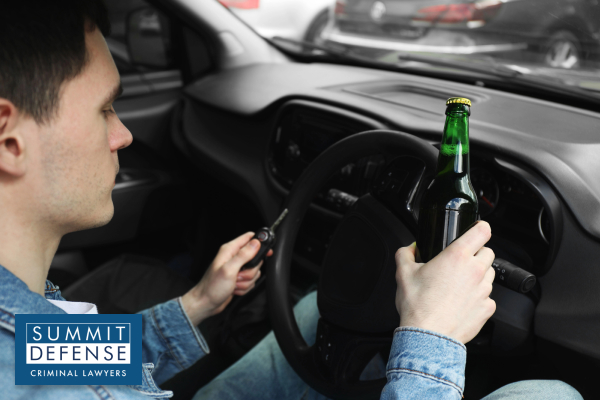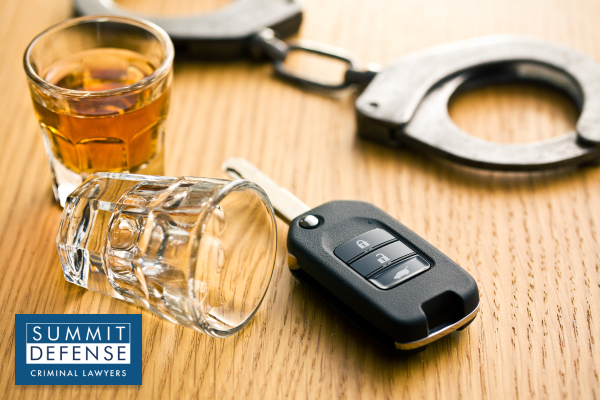Understanding DUI Charges and Possible Defenses
Understanding what you're facing with DUI charges and knowing your defense options is crucial for anyone arrested for DUI in California. Your defense attorney will need to look at every part of your case, from the DUI stop to how tests were given. Let's break down what makes up DUI charges and how a good defense team can fight them.
What Constitutes a DUI Charge in California?
In California, you can be charged with DUI under Vehicle Code 23152(a) if you drive after you have drunk alcohol, no matter what your blood alcohol level is. You can also be charged under VC 23152(b) for driving with a blood alcohol content over the legal limit of 0.08%. This means you can face a DUI charge even if your driving seemed normal, just based on test results showing you were over the legal limit when police arrived.
First-time offenders face mandatory fines up to $2,000, possible jail time up to six months, license suspension, and DUI classes. If you get caught again, you face even higher mandatory fines, with longer jail sentences and longer license suspensions. Commercial drivers must follow stricter rules, with a legal limit of just 0.04% BAC.
The state must prove you were driving a motor vehicle while showing physical signs of alcohol impairment or over the legal limit. They need to show that you had actual physical control of the vehicle and either seemed drunk or had a BAC above the legal limit. Without both parts, your DUI attorney can work to dismiss or reduce the charges.
How a DUI Attorney Can Challenge the Prosecution's Case
A good DUI attorney looks at every part of your case for weak spots. We check for procedure mistakes, rights violations, and problems with how evidence was collected. Often, these issues can get evidence thrown out or charges reduced.
Prosecutors rely on police reports, chemical test results, and officers' observations to build their case. Our defense strategy often involves:
- Challenging if the traffic stop had legal justification
- Questioning how field sobriety tests were administered
- Doubting how accurate chemical tests were
By attacking these key elements, we create reasonable doubt about the evidence against you.
Common DUI Defenses Used by Skilled Attorneys
 When fighting a DUI charge, the defense strategy you use can make all the difference between guilty and not guilty. Experienced DUI lawyers know that good defenses look at every step of the DUI investigation. From questioning why you were pulled over during a DUI stop to doubting test results, there are many ways to weaken the prosecution's case.
When fighting a DUI charge, the defense strategy you use can make all the difference between guilty and not guilty. Experienced DUI lawyers know that good defenses look at every step of the DUI investigation. From questioning why you were pulled over during a DUI stop to doubting test results, there are many ways to weaken the prosecution's case.
Challenging the Legality of the Traffic Stop
For a traffic stop to be legal, police officers must have reasonable suspicion that you broke a law. Without this legal reason, any evidence found afterward, including breath tests, blood tests, and what officers saw, can be thrown out. This protection against illegal search is one of the strongest DUI defenses.
We often review police videos and reports to see if officers had valid reasons for the stop. Sometimes, police claim they saw erratic driving or traffic violations, but video evidence shows something different. If we can prove the stop was based on a hunch rather than facts, we can file a motion to suppress evidence, which can destroy the entire case.
Courts have dismissed DUI charges when stops were based just on anonymous tips without officer verification, or when drivers were stopped at unlawful checkpoints. Even small procedure errors during the DUI stop can lead to case dismissal when properly challenged by your defense attorney.
Questioning the Accuracy of Field Sobriety Tests
Standardized field sobriety tests, like walking a straight line or standing on one leg, are very subjective. These tests are hard to do correctly, even for sober people, especially in stressful situations. Many factors not related to alcohol can cause poor performance on these tests, creating reasonable doubt about your alleged impairment.
Medical issues, nervousness, tiredness, and weather can all affect test results. We thoroughly check whether the officer gave the tests properly and whether your performance truly showed signs of drinking or was affected by other factors.
Officers are required to adhere to strict testing protocols. We check whether proper procedures were followed and if the tests were done in well-lit, flat areas. Many police officers don't have enough training in these techniques, leading them to mistake normal behaviors for physical signs of drunkenness.
Disputing Breath Test Results and Calibration Issues
Breath testing devices must be regularly checked and calibrated to give accurate results. California Title 17 regulations require specific procedures for breath test administration. Any mistake in how tests are administered can make the results useless in court.
These machines don't actually measure blood alcohol content directly—they estimate it based on breath samples. Many factors can cause falsely high readings, including:
- Mouth alcohol from recent drinking
- Certain diets
- Medical conditions like acid reflux
- Body temperature affects the breath testing device
Deep lung air samples can be tainted by mouth alcohol, leading to inaccurate breath test results.
We check records for the specific device used in your case, looking for calibration issues or patterns of bad readings. We also check whether the officer watched you for the required 15-minute period before testing to make sure mouth alcohol didn't affect the results. When these proper procedures aren't followed, we can often get breath test results thrown out.
Contesting Blood Test Procedures and Chain of Custody
While blood tests are usually more accurate than breath tests, they can still be challenged in many ways. Improper blood drawing techniques, contamination, and broken chain of custody can all mess up results. Blood samples must be properly preserved with stabilizing chemicals to prevent changes that could artificially raise the blood alcohol concentration.
We examine whether qualified personnel drew the blood sample, stored it properly, and analyzed it correctly. Lab technicians make mistakes, equipment breaks down, and samples get mixed up more often than you might think. The prosecution must prove that the blood sample tested was yours and was handled properly from start to finish.
Summit Defense has successfully gotten blood test evidence thrown out by showing improper storage, expired testing chemicals, or breaks in the chain of custody. When blood evidence is excluded, prosecutors often don't have enough evidence to continue their case, leading to dismissals or reduced charges.
Best DUI Defenses to Fight Your Case
Creating the best defense strategy to fight your DUI case requires looking at everything that happened during your arrest. The best defense attorneys use both science and legal knowledge to find the strongest arguments for your specific situation. Let's look at some of the best DUI defenses that have helped our clients win their cases.
Rising Blood Alcohol Content (BAC) Defense
Your blood alcohol level isn't fixed—it goes up and down over time. The rising BAC defense argues that while your BAC was over the legal limit when tested, it was below the limit when you were actually driving. This time difference can create reasonable doubt about your impairment when driving.
After you stop drinking an alcoholic beverage, your BAC keeps rising for 30 minutes to 2 hours before peaking. If police delayed testing you, your BAC might have gone above the legal limit by test time, even though you were under the limit while driving. This defense works best when there's a big time gap between the traffic stop and when the tests were administered.
Scientific studies back up this defense, and we often bring in experts to explain absorption rates. If you drank alcohol shortly before driving, this defense becomes even stronger, as the alcohol wouldn't have been fully absorbed while you were behind the wheel.
Medical Conditions Mimicking Intoxication
Many medical conditions can create symptoms that police officers mistake for being drunk. Diabetes, epilepsy, and neurological disorders can cause slurred speech, balance problems, and thinking issues—all physical signs officers link to drunk drivers. Even being tired or hurt from a recent accident can look like alcohol impairment.
Certain medical conditions can also directly affect breath test results. Acid reflux and similar conditions can cause alcohol from your stomach to come back up to your mouth, creating falsely high breath test readings. Low-carb diets or diabetes can produce compounds that breath testing devices incorrectly detect as alcohol.
We collaborate with medical experts who can explain your specific condition and how it might have affected your appearance or the test results. This expert testimony often creates enough reasonable doubt to win your case or convince prosecutors to reduce charges.
Improper Police Conduct During Arrest
To safeguard your rights, officers must adhere to strict protocols during a DUI arrest. When officers fail to follow proper procedures, key evidence may be excluded from your case. We carefully review police conduct at every stage of your arrest, looking for violations that could help your defense.
Officers are required to issue Miranda warnings before questioning you while you're in custody. If they didn't do this, any statements you made might be thrown out. Similarly, if officers lacked probable cause for the arrest itself, all evidence obtained afterward could be suppressed.
Video evidence from police body cameras or dashboard cameras can show differences between police reports and what actually happened. We thoroughly examine this footage for signs of misconduct or procedure violations that could weaken the prosecution's case against you.
DUI Defense Strategies Based on Evidence
 Building an effective defense against DUI charges requires looking carefully at all the evidence the prosecution has. Skilled defense attorneys know that the state's case often looks stronger on paper than it truly is when carefully examined. By finding weaknesses in how evidence was collected and analyzed, we can develop strategies that protect your rights and freedom.
Building an effective defense against DUI charges requires looking carefully at all the evidence the prosecution has. Skilled defense attorneys know that the state's case often looks stronger on paper than it truly is when carefully examined. By finding weaknesses in how evidence was collected and analyzed, we can develop strategies that protect your rights and freedom.
Lack of Probable Cause for Arrest
For a DUI arrest to be valid, officers must have probable cause—facts that would lead a reasonable person to believe you were driving under the influence. Without probable cause, any evidence obtained after your arrest may be deemed inadmissible in court through a motion to suppress evidence.
Probable cause requires more than just an officer's suspicion. They must observe specific physical signs of impairment or have valid test results showing you were over the legal limit. We review police reports and video evidence to check if officers truly had legally sufficient reasons to arrest you, or if they just made assumptions.
The Supreme Court has established that DUI arrests must be based on clear signs of impairment, not just the smell of alcohol or minor traffic violations. If officers arrested you without seeing you drive or without enough signs that you drank alcohol, we can often get the case thrown out through a motion showing unlawful search and seizure.
Inaccurate or Mishandled Chemical Test Results
Chemical tests—whether breath, blood, or urine—are only as reliable as the individuals conducting them and the equipment used. Test results can be challenged for many reasons, including:
- Operator error
- Equipment problems
- Improper handling of samples
Breath testing devices need proper maintenance to work correctly. We request records to verify that the machine that tested you was working correctly. These records often show patterns of errors or maintenance issues that can invalidate your test results.
Blood samples must be drawn by qualified people, properly preserved, and correctly analyzed. Lab technicians make mistakes, including mislabeling samples, using dirty equipment, or improperly storing specimens. These errors can lead to falsely high BAC readings that don't show your true level when driving.
Witness Testimony and Expert Challenges
Eyewitness testimony can be crucial in DUI cases. Witnesses who saw you before or during driving might testify that you showed no signs of being drunk, directly contradicting what officers claim. We find and talk to potential witnesses whose testimony might help your defense.
We work with expert witnesses—including toxicologists, former law enforcement, and accident specialists—who can challenge the prosecution's view of evidence. These experts explain scientific concepts to jurors in simple terms, showing why test results might be wrong or why your behavior wasn't necessarily because of alcohol.
Cross-examination of prosecution witnesses often reveals inconsistencies or bias. Police officers sometimes exaggerate what they saw or misremember details that become clear during questioning. By highlighting these differences, we create reasonable doubt about the state's evidence against you.
Driver's License Consequences and Legal Defense
When facing a DUI charge, many people are surprised to learn that their driver's license is at immediate risk, even before any conviction in criminal court. The DMV process runs at the same time as your criminal case, with its deadlines and rules. Understanding how to handle both systems is essential to keeping your driving privileges.
Fighting License Suspension with a DUI Attorney
After a DUI arrest, you have only 10 days to request a DMV hearing to contest your automatic license suspension. This process is completely separate from your criminal case, and failing to request this hearing results in automatic suspension, no matter what happens in court.
We represent clients at DMV hearings, challenging the officer's reports and testing procedures. Unlike criminal court, where the standard is "beyond a reasonable doubt," DMV hearings use a lower standard of proof. Despite this challenge, we've successfully prevented license suspensions by finding procedure errors and testing problems.
If a suspension cannot be avoided, we help clients get restricted licenses that allow driving to work, school, or DUI programs. For many people, keeping some driving privileges is crucial for their job and family. We guide you through the process of applying for these restricted licenses and meeting all DMV requirements.
California's implied consent law means you agreed to chemical testing when you got your driver's license. Refusing tests leads to facing mandatory fines and harsher license penalties. Still, we can sometimes challenge refusal allegations by showing you weren't properly told about the consequences or were unable to complete the test.
How Our DUI Defense Lawyer Fights for Your Rights
 At Summit Defense, we have over 120 years of combined experience handling DUI cases. Many of our defense lawyers used to work as prosecutors, so we know how the other side builds their cases. This inside knowledge helps us plan better defense strategies right from the start. We focus only on criminal defense in the Bay Area, so we know the local courts, judges, and DUI prosecutors very well.
At Summit Defense, we have over 120 years of combined experience handling DUI cases. Many of our defense lawyers used to work as prosecutors, so we know how the other side builds their cases. This inside knowledge helps us plan better defense strategies right from the start. We focus only on criminal defense in the Bay Area, so we know the local courts, judges, and DUI prosecutors very well.
Having the right defense attorney can change everything in a DUI case. We look at each client's case closely and check every detail that might create reasonable doubt. Unlike some firms that rush for quick plea deals, we prepare every case as if it's going to trial. This careful approach often leads to reduced charges, smaller penalties, or even getting cases thrown out completely.
Time matters after a DUI arrest. You only get 10 days to file for a DMV hearing and protect your license under California’s implied consent law. The sooner we start on your defense, the more ways we can fight the evidence. Starting early lets us get witness statements while memories are fresh and review police reports before evidence disappears.
When facing drunk driving charges in the Bay Area, you need a defense plan made just for your case. Our approach mixes legal know-how with personal attention to build the best defense for you. Whether we're questioning breath test results or challenging field sobriety tests, we find the weak spots in the state's evidence to protect your rights and freedom.
FAQs About DUI Defenses in the Bay Area
 At Summit Defense Criminal Lawyers, our DUI attorneys understand the common defenses used to fight DUI charges. A DUI arrest can flip your life upside down, but with the right help, you can beat these charges. We've helped many Bay Area clients win their DUI cases by checking everything from the traffic stop to the test results. Our track record shows that a good lawyer makes a huge difference when fighting drunk driving charges.
At Summit Defense Criminal Lawyers, our DUI attorneys understand the common defenses used to fight DUI charges. A DUI arrest can flip your life upside down, but with the right help, you can beat these charges. We've helped many Bay Area clients win their DUI cases by checking everything from the traffic stop to the test results. Our track record shows that a good lawyer makes a huge difference when fighting drunk driving charges.

 When fighting a DUI charge, the defense strategy you use can make all the difference between guilty and not guilty. Experienced DUI lawyers know that good defenses look at every step of the DUI investigation. From questioning why you were pulled over during a DUI stop to doubting test results, there are many ways to weaken the prosecution's case.
When fighting a DUI charge, the defense strategy you use can make all the difference between guilty and not guilty. Experienced DUI lawyers know that good defenses look at every step of the DUI investigation. From questioning why you were pulled over during a DUI stop to doubting test results, there are many ways to weaken the prosecution's case. Building an effective defense against DUI charges requires looking carefully at all the evidence the prosecution has. Skilled defense attorneys know that the state's case often looks stronger on paper than it truly is when carefully examined. By finding weaknesses in how evidence was collected and analyzed, we can develop strategies that protect your rights and freedom.
Building an effective defense against DUI charges requires looking carefully at all the evidence the prosecution has. Skilled defense attorneys know that the state's case often looks stronger on paper than it truly is when carefully examined. By finding weaknesses in how evidence was collected and analyzed, we can develop strategies that protect your rights and freedom. At Summit Defense, we have over 120 years of combined experience handling DUI cases. Many of our
At Summit Defense, we have over 120 years of combined experience handling DUI cases. Many of our  If you're facing DUI charges in the Bay Area, time is not on your side. Every day that passes without legal representation can hurt your case as evidence disappears and deadlines approach. Our experienced DUI attorneys are ready to start building your defense immediately with a free, no-obligation consultation.
If you're facing DUI charges in the Bay Area, time is not on your side. Every day that passes without legal representation can hurt your case as evidence disappears and deadlines approach. Our experienced DUI attorneys are ready to start building your defense immediately with a free, no-obligation consultation.